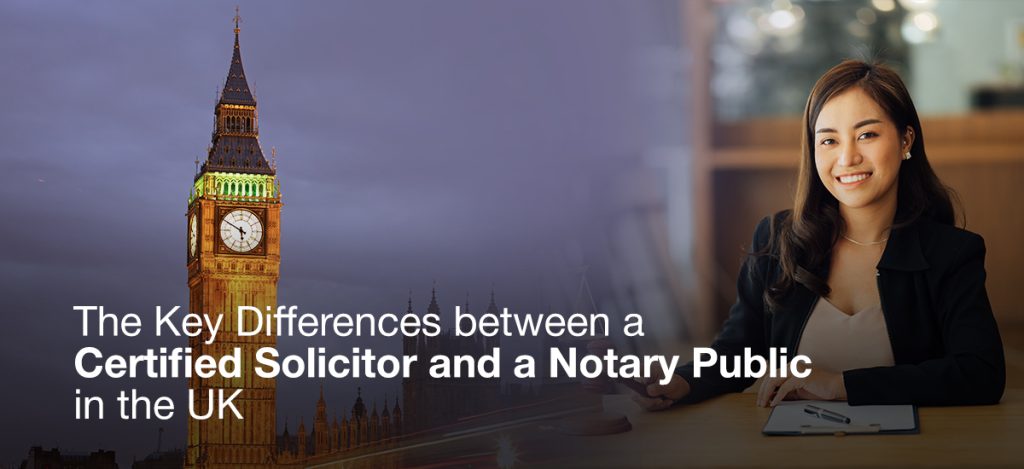A certified solicitor is a legal professional who advises clients on legal issues and represents them in court. A notary public, also called a notary, is authorized to witness the signing of legal documents, usually concerned with deeds, estates, licenses, power of attorney, affidavits and trusts. This blog outlines the difference between Certified solicitor and notary public.
What are the key Responsibilities?
Notary Public
As a publicly commissioned official, a notary public is responsible for verifying the authenticity of documents and serves as an impartial witness when signing legal documents. Legal documents are notarised to ensure they are correctly executed and deter fraud. The notaries must identify signatories to a document submitted for document notarization to weed out imposters and ensure that parties agree willingly and knowingly.
Government authorities, such as a court, state governments or a regulatory body, appoint notaries. They do not receive government remuneration and earn income from service fees.
To be admitted as a Notary Public in the UK, a person must be at least 25 years of age and have a Degree in Law or hold a position as a solicitor of the senior courts of England and Wales or a barrister at law. He/she must have taken the oath of allegiance under the Public Notaries Act 1843.
Who is a Certified Solicitor in the UK?
To become a certified solicitor in the UK, a person must obtain a degree in any subject or equivalent qualification, pass both stages of the Solicitors qualifying examination (SQE), and complete two years of qualifying work experience with a recognized firm. You must also meet the character and suitability requirements of the Solicitors Regulation Authority (SRA). While a law degree was previously required, the SQE system allows individuals with any degree to qualify as a Solicitor.
Solicitor checker
To check a solicitor’s record on the SRA website, you need to visit the SRA flatform and follow the instructions indicated.
Solicitor id verification
In the UK, a solicitor verifies a client’s identity by checking a valid photographic ID document, such as a passport or a driving license, against the individual’s details. The clients are asked to complete a form to document the process and ensure compliance with anti-money laundering regulations.
What is Solicitor document certification?
A solicitor certifies documents as true copies or actual originals. The solicitor certification of documents is helpful for legalization purposes, and the certification is recognized in the UK and abroad. A solicitor can certify educational certificates, identification documents and legal documents. A solicitor’s certification statement includes:
- A declaration that the solicitor has seen the original document.
- The solicitor’s signature, printed name, qualification, and contact details.
- A statement that the copy is a true and accurate representation.
Some key differences between a notary and a solicitor are:
- Solicitors refer to many people in the legal profession; notaries are much rarer.
- Notaries are concerned with the authenticity of documents rather than representing a client.
- Solicitors can help with contentious legal matters, while notaries must be impartial.
- Notaries have additional training, background checks, and a good standing certificate.
- Certified Solicitors provide legal advice and representation, while Notary Publics focus on witnessing signatures, authenticating documents, and performing notarial acts.
- The SRA regulates Certified Solicitors, while Notary Publics are regulated by the Faculty Office or the Master of the Faculties.
How do you get a document notarized in the UK?
To notarize a document in the UK, you need to take it to a Notary Public who will verify your identity, witness your signature on the document, and then apply their official notary seal, certifying the document as authentic. You may have to make an appointment with a notary public to have your document notarized. The notary will physically watch you sign the document before applying their unique seal.
How Helpline Group in the UK can help?
Helpline Group in the UK specializes in providing expert assistance in certified solicitor and notary public services to clients in the UK by their well-known experts. They assist in certifying the documents and authenticating legal documents like wills, deeds, licenses, etc., for clients in the UK in a hassle-free manner. With over 25 years of experience, 300+ experts, and a global presence, we assure you of reliable and expeditious certified solicitor and notary public services in the UK.
